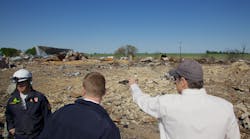The Texas House Committee on Homeland Security and Public Safety hosted a hearing May 1 about the West Fertilizer Co. explosion. The committee heard testimony from many of the Texas state agencies that interact with companies like West Fertilizer, to understand the role each agency plays in the safety, oversight and local emergency planning for Texas industrial plants and businesses.
In recent days, Texas Gov. Rick Perry has said the state is not to blame for the explosion at West, suggesting that no regulations could have prevented the tragedy,
Perry’s suggestion runs counter to investigations by existing reports that found that lax state and federal regulation allowed for 270 tons of ammonium nitrate at the facility to go unreported to the Department of State Health Services – 1,350 times the amount that normally triggers an alert.
Phillip Martin, political director of Progress Texas, noted that state agency officials were “cooperative when testifying, sharing all the information they had and clearly detailing what role they did or did not have in the oversight, regulation and emergency planning preparedness for Texas’ industrial plants.”
He added that the hearing made what he called Texas’ “severe lack of regulation” of industrial plants and hazardous chemicals “abundantly clear.”
According to Martin, state agency after state agency repeatedly answered questions by saying, “We’re not required to do that.”
Despite his insistance that no regulations could have prevented the West disaster, Texas Gov. Rick Perry did say, “If there’s a better way to deal with these events, we want to have that discussion, whatever that might be.”
“Gov. Perry must now prove he is true to his word,” said Martin. “The protection of the health and safety of the people of Texas should be the first and foremost priority of the state of Texas. Gov. Perry and the [state] legislature should heed the warnings from today’s hearing and pro-actively pursue proper regulations that can mitigate future disasters like the one in West.”
Martin said he believes the best path forward for state agencies and the Texas legislature is to continue the work started by the May 1 hearing: identify where the gaps in regulation exist, work together cooperatively to determine the best solutions for closing those gaps and pass legislation that properly regulates our state’s industrial facilities.

